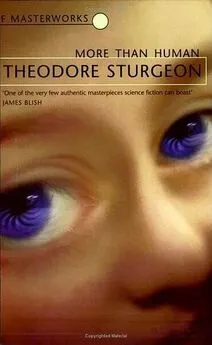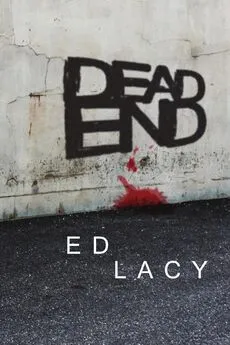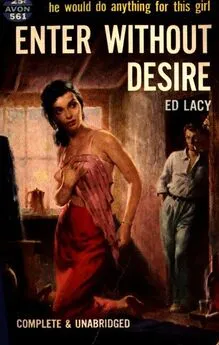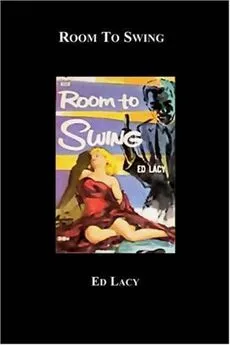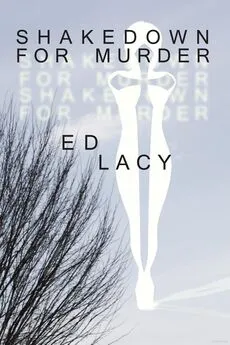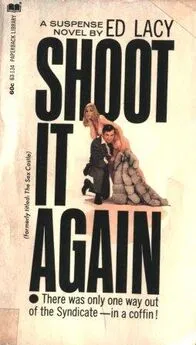Ed Lacy - Breathe No More My Lady
- Название:Breathe No More My Lady
- Автор:
- Жанр:
- Издательство:неизвестно
- Год:неизвестен
- ISBN:нет данных
- Рейтинг:
- Избранное:Добавить в избранное
-
Отзывы:
-
Ваша оценка:
Ed Lacy - Breathe No More My Lady краткое содержание
Breathe No More My Lady - читать онлайн бесплатно полную версию (весь текст целиком)
Интервал:
Закладка:
Jackson arose to point out that the confession had not as yet been placed in evidence, and Wagner said he was merely asking Joel what Kolcicki had told him. Jackson waved his hands, said he didn't want to delay the trial and would withdraw his objection. If this was meant to rattle Wagner, it had as much effect as a baby slapping the side of a battleship. If anything, it annoyed the judge.
Wagner then asked, “Mr. Hunter, during the recent time you spent in the Anthony home, the various other times you were together with Mr. and Mrs. Anthony, did you hear them quarrel often?”
Joel licked his lips, fondled his thick glasses. One could almost see his brain working, trying to figure what sort of answer would benefit Matt Wagner said softly, “Come, Mr. Hunter, it's a simple question: did they often quarrel, make cutting remarks at each other?”
“I would say they often teased each other.”
Teased? Before July 25th did you ever hear Mr. Anthony shout at his wife in anger? Or Francine Anthony shout in anger at him?”
“Yes sir.”
“Have you heard either of them shout at the other in anger a few times?”
“Quite a few times.”
“Did you ever hear Mr. Anthony quarrel with his wife while under the influence of liquor?”
Matt's smile grew larger as he made a fast note.
“I'm not an expert, can not say whether he was ever drunk or—”
Wagner broke in impatiently, “Come, now, Mr. Hunter, I didn't ask if he was drunk. Have you ever heard Mr. Anthony argue with his wife after you had seen him take one drink or more?”
“Well... yes, sir.”
“Have you ever heard Francine Anthony argue with her husband after she had one or more drinks?”
“Yes.”
Matt whispered something to Jackson who made a motion as if telling him to shut up. Matt grinned happily.
“Am I correct in stating that over a period of time you have witnessed the Anthonys in argument over various matters, sometimes when either or both of them had been drinking?”
“Yes, sir—petty family quarrels.”
“I see, family arguments. Now, think carefully, Mr. Hunter. At any time while they were exchanging words, arguing, at any time except on July 25th, did you ever hear Mr. Anthony threaten to kill his wife?”
“Oh, no, sir.”
“No matter how angry Mr. Anthony was?”
Joel said, “Indeed not,” before Jackson could spring to his feet and object that the degree of anger had never been established. Wagner said something I didn't catch and the judge upheld the objection. Wagner bowed slightly—toward nobody —asked, “Mr. Hunter, at any time except on July 25th did you ever hear Matt Anthony threaten to kill Francine Anthony?”
“No, sir.”
Wagner said, “That will be all, Mr. Hunter.”
Wagner sat down and as Joel started to leave the stand, Jackson climbed to his feet slowly—a deliberate movement emphasizing his gawky, Lincolnesque height. “One moment, Mr. Hunter, I have a few questions.”
For some reason this caused faint laughter in the courtroom, even the jurors grinned. Jackson stood beside the witness chair, but facing the court, as he asked, “Mr. Hunter, do you believe in the United States Constitution?”
“Of course I do.”
“Do you believe in all of the Constitution?”
“Yes, sir.”
“Do you think Prof. Brown invented the Fifth Amendment?”
Joel's large face was utterly confused. As Wagner got to his feet the judge said sternly, “Mr. Clair, I will not tolerate sarcasm in this court. I trust I shall not have to warn you again about this.”
Jackson turned toward the judge, his booming voice actually ringing with sincerity. “Your Honor, being a lawyer I respect the court and the law. I was not being sarcastic. This witness has stated the late Mrs. Anthony wanted Prof. Brown to leave the Anthony house because he had taken the Fifth Amendment, as if it was a criminal act. I am merely trying to show that the Fifth Amendment is a part of the Bill of Rights, put into the Constitution for the purpose of—”
“Are you making a speech, Mr. Clair?” the judge asked.
“Sir,” Jackson projected his voice so it filled the courtroom, “I am only establishing that it is neither a criminal act nor a sign of guilt to use the Fifth Amendment This is of the utmost importance to the defense of my client.”
“Proceed with your cross-examination, Mr. Clair, but bear in mind I will not tolerate this court becoming a stage or a soap box.”
Jackson dropped his voice. “I certainly apologize, your Honor, if I have done either.”
Brown was sitting hunched up in his seat From the side his broken nose actually made him resemble an old fighter. I knew what he was thinking: If he became the object of the trial publicity he would have little chance of keeping a job— if he'd found one.
Jackson turned abruptly to Joel, who was trying to vanish into a crack in the chair. “Now, Mr. Hunter, you have stated you heard Mr. Anthony allegedly threaten his wife. Will you—”
Wagner objected to the word “allegedly,” and there was some quibbling between the lawyers as to what constituted a threat. When the judge quieted them, Clair asked, “Mr. Hunter, will you kindly repeat the exact words Mr. Anthony said to his wife?”
Joel stammered, “Well, he—he said, 'Francine, some things I'll take from you because it's a kind of game between us. But Hank Brown is one of the few real things in my life. If you ever say a single out-of-the-way word to Hank, I'll k-kill you. I mean that.' That's what Matt said... I believe.”
“Believe? Did he say it, or not?”
“Yes, sir, he said that. I meant those were the exact words, to the best of my recollection.”
“When Matt Anthony said it was a kind of game between them, did you think... I withdraw the question. Mr. Hunter, after hearing Mr. Anthony say this to his wife, what did you do?”
“Me?” Joel asked, bewildered. “I went upstairs with my wife, to our room. Talked over a book idea with her.”
“And after that?”
“We came down and went outside to sun ourselves, play with the dog.”
“Didn't you call the police, Mr. Hunter?”
“The police?” Poor Joel wiped some sweat from his upper lip with his tongue. “Why should I call the police?”
“Mr. Hunter, if you heard a person threaten to kill another, wouldn't you call the police, do something about it?”
Joel waved his hands, mixing air. “Oh, I knew it was just talk.”
Jackson looked astonished. “Then you didn't consider it a threat?”
“No, sir, I did not.”
“That will be all. Thank you, Mr. Hunter.”
As Jackson walked away, Wagner got up. “One moment, Mr. Hunter. Did you hear Mr. Anthony say to his wife, 'I'll kill you'?”
“Yes, sir,” Joel whispered.
As Joel left the stand, Matt sat tilted back in his chair, studying Joel as if he was a painting. Then he smiled and started writing. Jackson made a few notes, glancing at the jury. He whispered something to Matt, who shrugged and pointed to the pile of papers in front of him, went on writing.
May Fitzgerald was the next witness. Matt stared at her for a long time before he went back to his writing. His hand was tired and several times he dropped his pencil, seemed to shake the fatigue out of his right hand. Wagner established— again—that although May had often heard the Anthonys argue she had never heard Matt threaten to kill Francine, or even to strike her. Jackson gave her a friendly smile as he asked, “Miss Fitzgerald, as far as you know, did Mrs. Anthony ever work?”
“Do you mean did she hold a job?” May asked with her slightly clipped accent.
“Yes, did she hold down a job?”
“Not so far as I know.”
Jackson took a few strides in front of the witness stand. “Did the Anthonys entertain often? Did they often have guests for the weekends, for dinner?”
“Very often. On some weekends we had as many as 20 people out.”
“You were the only maid?”
“Yes.”
“Seems you had quite a lot of work. Did Mrs. Anthony often help you with the cooking or serving?”
“No.”
“Did you do the shopping, too?”
“I did.”
“Did you see Mr. Anthony drink much?”
“I saw him take a drink only now and then, especially when guests were drinking.”
“Miss Fitzgerald, you have stated that you often heard the Anthonys argue. Do you mean Mrs. Anthony nagged him?”
“Yes.”
“Over what?”
“Over everything. Money, his drinking and his swimming —not watching his heart. She had a sharp tongue.”
Jackson stopped his walking. “Did you say she had a sharp tongue?”
“I did.”
Wagner seemed undecided whether to object or not, let it go.
“What does a sharp tongue mean, Miss Fitzgerald?”
“Well, she was not gentle in her comments, she was a blunt woman.”
Jackson solemnly nodded, as if in agreement that this was a horror. Then he asked, “Did Mr. Anthony use his house for both a home and an office?”
“He wrote every day.”
“In the house?”
“Yes.”
“Did he have any other office, any other place where he worked?”
“Not that I know of. Every day he went to his den and worked.”
“Would you say Mrs. Anthony nagged him every day, every other day, or every week?”
“Oh, I'd say every day.”
Jackson said that would be all. Wagner stood up and asked, “Miss Fitzgerald, did Mr. Anthony nag his wife every day, too?”
“Well... it takes two to tango,” May said to faint laughter in the courtroom.
When May stepped out of the witness box the judge announced the court was recessed for lunch. I waited for the others to come out. I shook hands with Brown and asked how things were. He said, “I have a good job as a mathematician with a manufacturer out West—non-defense production. At least I had it before the trial started.”
“Have lunch with me,” I said, keeping an eye out for the Hunters.
“No, I think it best I duck reporters and people.”
“Where are you staying?”
“I haven't been able to locate a room yet. Most places are filled.
“I'm at the motel up on the hill. Twin beds in the room if you want one.”
“Young man, I keep telling you it's risky to be seen with me if—”
“Nonsense, Hank.”
“Thank you for the kind offer. I may take it. I'll see you later, Norman.”
Joel came out with May and Wilma. Joel said, “Come with as, I need a drink something awful.”
I nodded at the women and we headed for a restaurant across the street. A photographer begged us—or rather Joel and May—to pose for a picture but Joel refused, practically ran across the street and into the restaurant. Wilma squeezed my arm, asked, “I thought you were going to call us?”
“I did one Saturday afternoon, but no answer,” I lied. “We've been busy—fixing up a house in the country. Soon as it's presentable, I intend to ask you and Joel up.”
“Careful, you know what happened the last time we were house guests.”
We found a corner table and several people stared at us. We ordered cocktails and lunch. Joel said bitterly, “Oh, that Wagner, that cool sonofabitch, why did he have to make me the star witness?”
“Well, you should have stood up to him instead of acting so mealy-mouthed,” Wilma said.
“Oh, that would have been dandy, get me reams of publicity, all lousy! 'Joel Hunter, writer of juveniles, balks D.A.' The libraries would love that! Oh my God, what will my editor say when she sees me on the front pages tonight.”
Wilma reached across the table and patted his hand, a motherly gesture. “Honey, you did fine. Say, isn't that Clair an odd one? What a homely face, and so attractive.”
Читать дальшеИнтервал:
Закладка:

